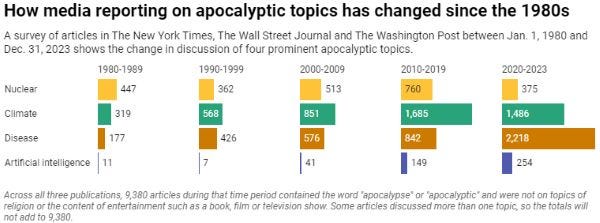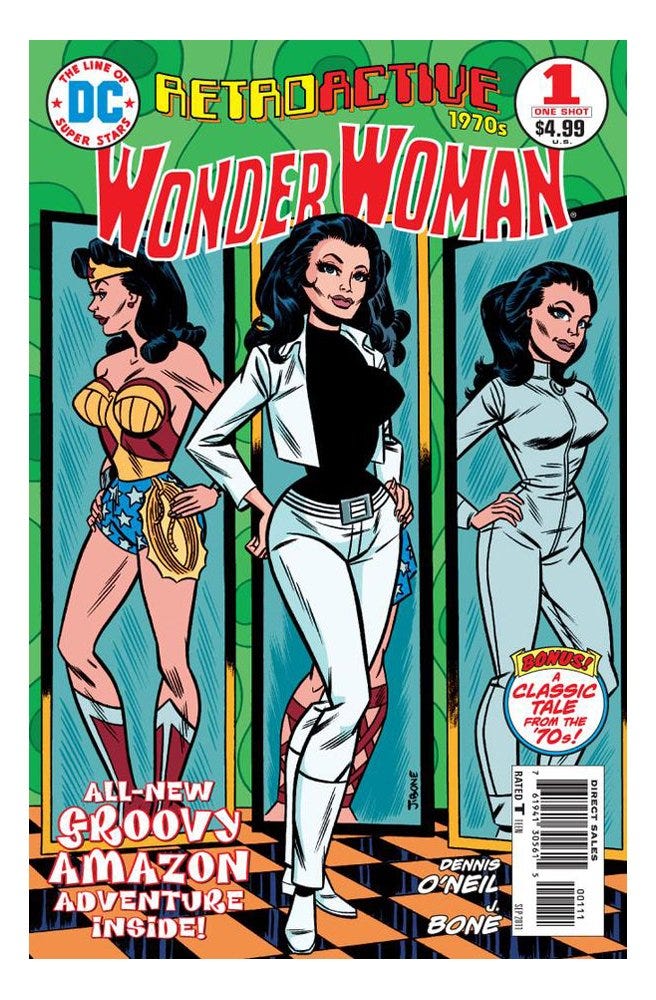Groovy Amazon Adventure
not the rain forest kind
My sister posted some de-colored pics of my mom to Facebook for Mother’s Day.
On this rainy gray May day-after, this one seems appropriate. Not a smiler, my mom. Not on demand for pictures, anyway.
I had stepped away from the locally produced interview show Comic Culture for a while. When I returned to it recently, the latest episode starred Alisa Kwitney, daughter of science fiction author Robert Sheckley.1 2 She was working on a comic series called Howl, set in the late 1950s, which she called a cross between Mrs. Maisel and Invasion of the Body Snatchers.
I can never pass up an opportunity to plug the wonderfully dense and salty audio series Welcome to Mars by Ken Hollings and Simon James. I thought of that as Ms. Kwitney described a tourist trend of going to Vegas and watching bomb blasts from the balcony of the Sands with an atomic cocktail.
From American Experience on PBS:
Days after the first bomb was detonated on January 27, 1951, the Las Vegas Chamber of Commerce issued a stream of press releases excitedly describing the new testing grounds as one of the many attractions Las Vegas had to offer. As one official described, "The angle was to get people to think the explosions wouldn't be anything more than a gag."
Another thing that struck me was Ms. Kwitney’s making fun of her father’s gender-equality blind spot. It reminded me of something I read by comics writer Denny O’Neill, who infamously removed Wonder Woman’s powers and turned her into a spy during the 70s. Like Emma Peel3 from The Avengers, but in white leather instead of black — and not British.
I can’t find the precise quote but it was something like, We were trying, but we just didn’t quite get it. “It” being feminism.
A post by
reminded me of my mother, who was economically a feminist, in that she kept her job after she married (to considerable criticism from the family), but not socially a feminist, in that she never wore pants or makeup or cut her hair (things that my sister, a generation later, felt were vitally important to her teenage self-determination). My mom was selective. Consciously or not, she chose specific aspects of feminism that appealed to her personally.I won’t elevate Starship Troopers to a paradigm, but most of what we believe as humans is just shit we heard somewhere. Very little of it is based on direct experience, because that’s slow and often painful. Very few of us have the emotional fortitude to stop and think instead of immediately reacting, saying yes or no to that random thing we just heard, often acting on that yes or no because it fits a narrative we’ve been telling ourselves. I can do that stop-and-think thing sometimes, about some subjects that are not too close to my emotional core, but not all the time.
And we wouldn’t want to question everything, all the time. From last week’s Seeds of Science:
Under normal conditions, scientists working inside a paradigm don’t question these commitments any more than Formula 1 drivers question the fact they're about to race cars instead of bobsleds. Instead, the common language of the paradigm makes it easy to work together, make sense of the world, and go really really fast.
It’s hard to question your culture, because the whole point of culture is to not waste time with stupid questions that everybody already knows the answers to. Culture is a shortcut, an efficiency. But when the environment changes, those old answers may or may not be relevant, and we have to go into search mode, or as Thomas Kuhn called it, “crisis mode.”
If We Burn
describes in great historical detail the recent development of our current political crisis, as it played out during the past ten years across the Middle East, Ukraine, and especially Brazil, which flipped from lefties Lula and Dilma Rousseff to Jair Bolsonaro (who it seemed actually wanted the entire rain forest cut down and turned into cattle ranches?!?) and then back to Lula.When a rule-based society breaks down, and the copycat humans start copying more locally, more blindly, on a shorter time scale (meaning they change their minds more often) things get weird.
The tradition of all dead generations weighs like a nightmare on the brains of the living. -The Eighteenth Brumaire of Louis Bonaparte (1852)
Any answer can seem like a good answer, if it resonates emotionally. Even the end of the world.

How can the end of the world be a relief? If there’s one thing that humans hate, it’s uncertainty. From a recent study where they created an ambiguous stimulus that was both warm and cold (but neither intense enough to cause real damage), which triggered a burning pain:
"Our results show that uncertainty, not just expectation, plays an important role in pain. Previous research on placebo and nocebo effects has shown that expecting relief can reduce pain, while expecting harm can make pain worse. Our findings add a new layer: when the brain is unsure about what to expect and encounters ambiguous signals, it errs on the side of caution, intensifying pain beyond what's necessary," Francesca Fardo explains.
The researchers keep their conclusions pretty tight, on pain perception, but I would guess that anxiety might work the same way. There’s some support for this from another recent paper where they showed that people’s unconscious statistical estimates of how likely a shock was changed their behavior for the worse.
Of course, those are controlled lab experiments, not chaotic street protests involving thousands of people, but I’m a scientist. I believe that progress is possible and that we can figure things out.
I also know that other people are hurting now and may not be willing to wait. But towards the end of that book, after examining ten different uprisings around the world, Bevins was very clear: there is no such thing as a political vacuum. Burn down the current order, or even just blow big holes in it, and there are always opportunists waiting to seize that power for themselves.
Evil doesn’t just magically disappear when the Dark Lord falls. Tolkien knew that; after they went home, the Hobbits had to deal with Saruman (calling himself Sharkey), much reduced in power but not in malice, and still capable of ruining the Shire.
I really don’t want to end this on such a down note, so I’ll point you to this article on how one of Bevins’s case studies, Ukraine, has decentralized its government to let a thousand sunflowers bloom on the rebuilding of local infrastructure (even before the shooting has stopped)
as well as this pamphlet collecting essays on similar ideas.
Here eulogized by another SF author you’ve probably never heard of, Rudy Rucker.
https://medium.com/@rudyrucker/robert-sheckley-1928-2005-3ef17d606ee7
No offense to either very talented person. People forget about me, and I’m still here.
I also liked this Guardian obit by Christopher Priest.
“In a just world, Sheckley would be recognised as one of the most important American short story writers of the 20th century but, as anyone who has read him knows, while justice might in theory be available, it is not for everyone - and then only with a catch.”
We will return to the talented Ms. Rigg shortly, I hope. RIP.






Coincidentally (and I mean that, because he posted it the day after I posted this issue of the newsletter), Adam Mastroianni lays out a new paradigm for psychology.
https://substack.com/home/post/p-163427720
And I think it's a good one, though when I've written about control systems in the past I would never have been so bold as to label it a paradigm.
http://www.intergalacticmedicineshow.com/cgi-bin/mag.cgi?article=015&do=columns&vol=randall_hayes
That's on me, I guess.